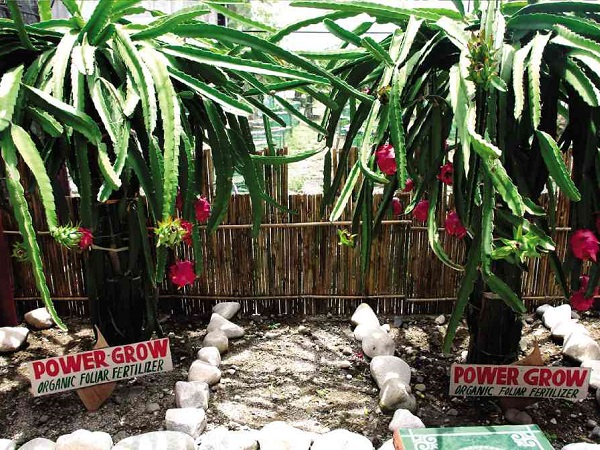Dragon fruit takes over Ilocos Norte

Dragon fruit plants can be seen in school gardens, backyards, roadsides and plantations in Ilocos Norte. LEILANIE ADRIANO/INQUIRER NORTHERN LUZON
BATAC CITY—In the last three years, the odd-looking dragon fruit has been attracting the attention of plant and fruit lovers and tourists alike.
And with the high demand for this exotic fruit known for its therapeutic properties, idle public and private lands in Ilocos Norte, including village roadsides, backyards and school compounds, are being turned into pocket dragon fruit farms.
The dragon fruit, “saniata” to locals, is now produced by Ilocanos all year round through an “extended daylight technology,” where growers put light bulbs in between posts of dragon fruit plants to induce flowering during the off-season.
With the benefits Ilocanos have been deriving from growing dragon fruit, provincial officials, growers, the academe and research agencies have decided to stage a festival to showcase research and innovation about this “wonder fruit.”
The Dragon Fruit Festival, celebrated every July, is now on its third year. The celebration this year in this city was staged on July 9-11.
Article continues after this advertisementThe Mariano Marcos State University (MMSU), the Kailokuan Saniata Growers Cooperative (KASACoop), the Ilocos Agriculture and Resources Research and Development Consortium (Ilarrdec), the provincial government, Department of Agriculture and the Department of Education have institutionalized the festival to further promote the industry.
Article continues after this advertisementThis year, the three-day festival included a fun walk, cookfest, essay writing and photojournalism competitions and a technology forum where plant enthusiasts, research and development workers, investors and students participated.
The propagation of dragon fruit in Ilocos Norte was pioneered by exotic plant hobbyist and farmer Edita Dacuycuy, who has inspired other farmers here and abroad to follow her lead.
In what was meant as a trial and error propagation of this cactus-like plant in Dacuycuy’s backyard garden in Pasuquin town eight years ago, dragon fruit is now grown in big plantations in Ilocos Norte and nearby provinces, including some areas in the Visayas and Mindanao.
Ilocanos refer to the dragon fruit as the “vine of life” because of its health benefits and the additional income that it gives to local communities and even schools.
Agriculture experts said the dragon fruit plant grows well in the province because of its favorable weather condition. The plant requires easily drained and highly organic soil, less irrigation and minimal maintenance.
Dragon fruit plants start bearing fruits in May until November. Growers harvest dragon fruits at least five times a year.
To date, at least 70 hectares of Ilocos Norte’s farm lands are planted with dragon fruit plant, benefiting 645 growers and their families. The province has become known as the dragon fruit capital of the country.
Dragon fruit is sold for P100 to P150 a kilogram in the Philippines and $7 (P302.96) per pound in the United States, growers said.
With this prevailing market price, dragon fruit growers and investors can earn if they penetrate the international market. Local growers have developed at least six varieties of dragon fruit in the Ilocos region.
Leonardo Pascua, project leader of the dragon fruit research and development extension of MMSU, said dragon fruit growers need to have at least 1,000 ha of dragon fruit plantations to supply the global market.
While Ilocos Norte’s production is still below the export target, growers here continue to produce other dragon fruit-based products that have found a steady market. Among these products are ice cream, jam, wine, vinegar, tea, cookies, pastries and even soap bars.